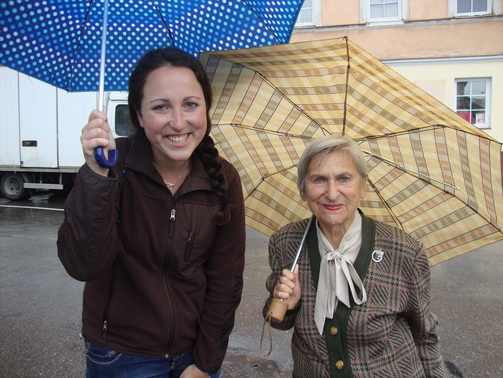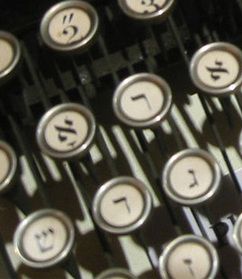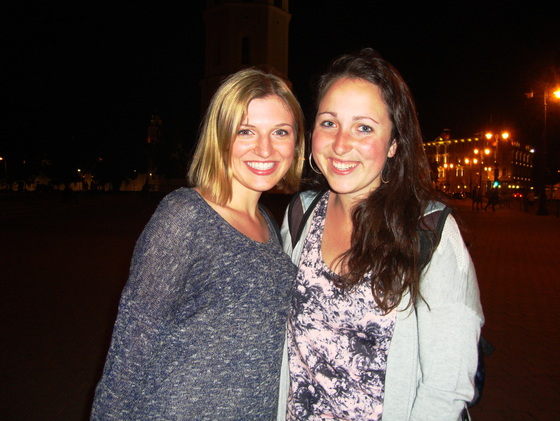Hi everyone! Thanks for tuning into the latest post about my summer adventure in Eastern Europe.
Sorry for the long space in time between this and my last post. Things have been so crazy here in
Vilnius, it’s been tough finding the time to write! Everyday has been jam packed – it’s been a lot of fun!
I just completed my third week of study at the Vilnius Yiddish Institute. Over the course of this time, I feel that my Yiddish abilities have significantly improved. I used to be shy about speaking Yiddish to others because I did not trust my abilities. Now, I feel that I can hold a semi-steady conversation in Yiddish with other students without feeling embarrassed. I’ve read many new Yiddish stories, I’ve
learned many Yiddish songs, and every day feels like a new language adventure.
A highlight of these past three weeks for me was last weekend when my Mom and Dad visited me in Vilnius. After finishing a wonderful six-day vacation in Paris, my parents flew all the way from Paris to Vilnius to spend 3 days with me. We had a great time together exploring Vilnius, celebrating Shabbat, and visiting the nearby town of Trakai where we saw the Former Grand Duke of
Lithuania’s Castle Fortress. Last week, I joined the choir of the Yiddish Institute, and I was so happy that my parents were able to come to our concert last Friday night. They were able to hear the Yiddish music that I have grown to love and it is now something we can share. At the end of their stay, on Saturday night, my parents took Ella and I out to dinner in Vilnius, and all together we had a great time eating classic Lithuanian food and drinking white wine (I’m legally allowed to drink in Europe!) The weekend with my parents went by so quickly, but I know I will always remember it. I love them both so much and am so happy they came.
Sorry for the long space in time between this and my last post. Things have been so crazy here in
Vilnius, it’s been tough finding the time to write! Everyday has been jam packed – it’s been a lot of fun!
I just completed my third week of study at the Vilnius Yiddish Institute. Over the course of this time, I feel that my Yiddish abilities have significantly improved. I used to be shy about speaking Yiddish to others because I did not trust my abilities. Now, I feel that I can hold a semi-steady conversation in Yiddish with other students without feeling embarrassed. I’ve read many new Yiddish stories, I’ve
learned many Yiddish songs, and every day feels like a new language adventure.
A highlight of these past three weeks for me was last weekend when my Mom and Dad visited me in Vilnius. After finishing a wonderful six-day vacation in Paris, my parents flew all the way from Paris to Vilnius to spend 3 days with me. We had a great time together exploring Vilnius, celebrating Shabbat, and visiting the nearby town of Trakai where we saw the Former Grand Duke of
Lithuania’s Castle Fortress. Last week, I joined the choir of the Yiddish Institute, and I was so happy that my parents were able to come to our concert last Friday night. They were able to hear the Yiddish music that I have grown to love and it is now something we can share. At the end of their stay, on Saturday night, my parents took Ella and I out to dinner in Vilnius, and all together we had a great time eating classic Lithuanian food and drinking white wine (I’m legally allowed to drink in Europe!) The weekend with my parents went by so quickly, but I know I will always remember it. I love them both so much and am so happy they came.
Another highlight of this program for me has been the relationship I’ve made with a 91 year old woman from Vilnius named Fania.
Fania Brantovskaya has lived in Vilnius (Vilna, in yiddish) her whole life. Fania was teenager during the years of the second world war and with her own eyes she saw the annihilation of Jewish population that used to be her community. Before WWII, Vilna used to be considered the Jerusalem of Eastern Europe. Jews from all over the world (musicians, artists, intellectuals, scientists,etc) would travel to Vilna see the vibrant, intellectual Jewish culture that made Vilna the hub that it was.
Before WWII, Vilna was the best place a Jewish person could live.
When the Nazis arrived, everything changed as Jewish people were dehumanized. Immediately, they were forced to leave their homes, move into one of two ghettos, and day by day face the danger of being deported to a concentration camp or taken to be shot in the nearby forests – which unfortunately was the fate of most. Vilna once had a population of 40,000 Jewish people, but after the war, there were only a few hundred survivors.
I first met Fania when she spoke to my Helix group when we came to Vilnius at the end of our trip. Over pizza and coffee, she told us her story – we learned about her childhood in Vilnius, about her life in the ghetto, and she explained to us her story her of survival, achieved by joining the
anti-Nazi resistance and serving as a partisan in the nearby Lithuanian forest. Fania is one of the liveliest women I’ve ever met. She is warm, spunky, very intelligent – and she is probably one of the
toughest people alive. What she lived through in the ghetto and in the forest is something I hope nobody will ever have to experience. Fania lost her entire family in the Holocaust. The way
that she can tell her story to strangers and be so positive while recalling these painful memories is amazing.
Fania Brantovskaya has lived in Vilnius (Vilna, in yiddish) her whole life. Fania was teenager during the years of the second world war and with her own eyes she saw the annihilation of Jewish population that used to be her community. Before WWII, Vilna used to be considered the Jerusalem of Eastern Europe. Jews from all over the world (musicians, artists, intellectuals, scientists,etc) would travel to Vilna see the vibrant, intellectual Jewish culture that made Vilna the hub that it was.
Before WWII, Vilna was the best place a Jewish person could live.
When the Nazis arrived, everything changed as Jewish people were dehumanized. Immediately, they were forced to leave their homes, move into one of two ghettos, and day by day face the danger of being deported to a concentration camp or taken to be shot in the nearby forests – which unfortunately was the fate of most. Vilna once had a population of 40,000 Jewish people, but after the war, there were only a few hundred survivors.
I first met Fania when she spoke to my Helix group when we came to Vilnius at the end of our trip. Over pizza and coffee, she told us her story – we learned about her childhood in Vilnius, about her life in the ghetto, and she explained to us her story her of survival, achieved by joining the
anti-Nazi resistance and serving as a partisan in the nearby Lithuanian forest. Fania is one of the liveliest women I’ve ever met. She is warm, spunky, very intelligent – and she is probably one of the
toughest people alive. What she lived through in the ghetto and in the forest is something I hope nobody will ever have to experience. Fania lost her entire family in the Holocaust. The way
that she can tell her story to strangers and be so positive while recalling these painful memories is amazing.
When Helix ended and the VYI began, I was so excited to hear that my relationship with Fania would not end there. Fania also serves as the librarian of the Yiddish library at the institute. Whenever I did my homework at the library, Fania would sit next to me, organizing the Yiddish books, always with a smile on her face. I’d tell her “Shalom-Aleichem” and she smile back, responding “Aleichem-Shalom!” Fania has loaned me several books from the library and I really don’t know what the institute would do without her!
Lucky enough, my parents were able to meet Fania when they came to visit because as we were standing outside the Holocaust museum in Vilnius (it had unfortunately just closed when we got there) out of the museum comes Fania who had just led a tour. In Yiddish, I introduced my parents to Fania and acted as translator for them, it was beyond cool. She was so happy to meet my parents and my parents were even more thrilled to meet her – a living partisan! My folks may not have been able to see the Holocaust museum in Vilnius, but they met someone who lived through it, so I’d say it's all good.
For a long time I had known that I wanted to interview Fania about her partisan experience, but I knew I needed to build my Yiddish speaking abilities first. After the third week of the program I felt ready and I planned with a new friend of mine and yiddish speaker, Dr. Jolanta Mickute, an interview with Fania. I prepared questions all in Yiddish to ask Fania and prayed all week that the interview would run smoothly. Yesterday, I interviewed Fania for three hours and it went wonderfully. Fania was thrilled to speak to us and told us her story from beginning to end. While I didn’t understand all that she was saying because she answered every question in Yiddish (she does not speak English), I was able to follow the main storyline and learned a ton. During the interview I couldn’t help but think: now, this is why I take Yiddish, for moments like these when I can speak to Holocaust survivors in their native language and remember the culture that for them brings back such fond
memories. Yiddish was the language of Fania’s family, of her city – it was the language of her people.
Lucky enough, my parents were able to meet Fania when they came to visit because as we were standing outside the Holocaust museum in Vilnius (it had unfortunately just closed when we got there) out of the museum comes Fania who had just led a tour. In Yiddish, I introduced my parents to Fania and acted as translator for them, it was beyond cool. She was so happy to meet my parents and my parents were even more thrilled to meet her – a living partisan! My folks may not have been able to see the Holocaust museum in Vilnius, but they met someone who lived through it, so I’d say it's all good.
For a long time I had known that I wanted to interview Fania about her partisan experience, but I knew I needed to build my Yiddish speaking abilities first. After the third week of the program I felt ready and I planned with a new friend of mine and yiddish speaker, Dr. Jolanta Mickute, an interview with Fania. I prepared questions all in Yiddish to ask Fania and prayed all week that the interview would run smoothly. Yesterday, I interviewed Fania for three hours and it went wonderfully. Fania was thrilled to speak to us and told us her story from beginning to end. While I didn’t understand all that she was saying because she answered every question in Yiddish (she does not speak English), I was able to follow the main storyline and learned a ton. During the interview I couldn’t help but think: now, this is why I take Yiddish, for moments like these when I can speak to Holocaust survivors in their native language and remember the culture that for them brings back such fond
memories. Yiddish was the language of Fania’s family, of her city – it was the language of her people.
Today, very few people speak Yiddish. Most of the Yiddish speakers perished in the Holocaust and the language itself is diminishing slowly due to lack of use. Programs like the Vilnius Yiddish Institute are so vital to the existence of the language because it is the young people who learn it who will carry its memory into the next generation. I am proud to be one of those young people. I’m
thrilled to keep this amazing language alive. Speaking to Fania in Yiddish, no matter how difficult it was for me, is a memory I’ll always have because of the smile on her face when speaking the language of her childhood.
Fania’s story has inspired me in so many ways. Fania’s will to survive, her bravery as a resistance fighter, and her pride to be Jewish has left a hand print on me. We share the same morals and I hope that one day, (under different circumstances of course), I can be as resilient and strong as she is. I hope to use her story as inspiration for my own story I hope to write which will be about the partisan resistance and the Jewish culture in Eastern Europe. I can’t wait to further educate myself about the Jews of Vilna and the resistance that proved they wouldn’t go down without a fight.
During the Holocaust, Jewish people resisted in all sorts of ways – by saving historical and literary documents, burying torahs underground, writing anti-Nazi pamphlets, running spiritual events, and fighting in the forests. I look up to all of these people who refused to obey the Nazi law, even in the face of death.
As living people today, I think the memory of the Holocaust resistance should be reminder that as human beings it is our responsibility to not simply ignore evil when it is happening – we must stand
against it. We must defy it. We must remember the Holocaust in order to make sure that something like it never happens again and we must look to the lessons of the Holocaust resistance as
models for our own behavior.
Tomorrow, with Fania as my guide, I will be visiting the Ponary forest in Lithuania where tens of thousands of Jewish people from Vilna were shot by the Nazis (Fania escorted the President of Israel to this historic site last week during his visit to Lithuania). Afterwards, Fania will be taking my group to her former partisan bunker in the forest and I will see where she lived, fought, and survived –keeping her language and culture alive with her. I am looking forward to this experience and I will be sure to write about it in my next post. I hope you all have nice weekends and again, thanks so much for reading.
All the best,
Arielle
thrilled to keep this amazing language alive. Speaking to Fania in Yiddish, no matter how difficult it was for me, is a memory I’ll always have because of the smile on her face when speaking the language of her childhood.
Fania’s story has inspired me in so many ways. Fania’s will to survive, her bravery as a resistance fighter, and her pride to be Jewish has left a hand print on me. We share the same morals and I hope that one day, (under different circumstances of course), I can be as resilient and strong as she is. I hope to use her story as inspiration for my own story I hope to write which will be about the partisan resistance and the Jewish culture in Eastern Europe. I can’t wait to further educate myself about the Jews of Vilna and the resistance that proved they wouldn’t go down without a fight.
During the Holocaust, Jewish people resisted in all sorts of ways – by saving historical and literary documents, burying torahs underground, writing anti-Nazi pamphlets, running spiritual events, and fighting in the forests. I look up to all of these people who refused to obey the Nazi law, even in the face of death.
As living people today, I think the memory of the Holocaust resistance should be reminder that as human beings it is our responsibility to not simply ignore evil when it is happening – we must stand
against it. We must defy it. We must remember the Holocaust in order to make sure that something like it never happens again and we must look to the lessons of the Holocaust resistance as
models for our own behavior.
Tomorrow, with Fania as my guide, I will be visiting the Ponary forest in Lithuania where tens of thousands of Jewish people from Vilna were shot by the Nazis (Fania escorted the President of Israel to this historic site last week during his visit to Lithuania). Afterwards, Fania will be taking my group to her former partisan bunker in the forest and I will see where she lived, fought, and survived –keeping her language and culture alive with her. I am looking forward to this experience and I will be sure to write about it in my next post. I hope you all have nice weekends and again, thanks so much for reading.
All the best,
Arielle



 RSS Feed
RSS Feed
